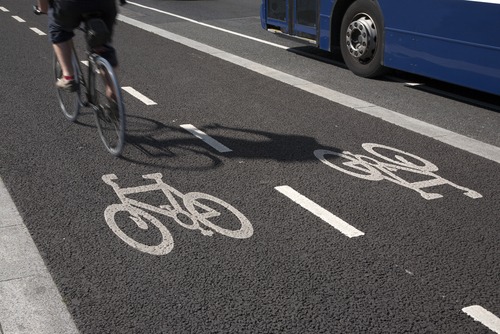
The city of Lynn, Mass. got its first-ever bus lane, as well as a network of bike lanes, as part of a series of quick-build multimodal road treatments, the city, MassDOT and MBTA announced Thursday.
As part of MassDOT’s Shared Streets and Spaces Grant, the collaborative effort will improve bus speed and reliability for nearly 3,000 bus riders daily. The project also included some shared bus-bike lanes and some dedicated bike lanes to support safe, sustainable transportation modes in the wake of the COVID-19 pandemic.
“This is a vital link for moving Lynn residents through their city and to other critical connections, whether it is to the Northern Strand Community Trail or the Blue Line at Wonderland,” said Acting Transportation Secretary Jamey Tesler. “In 2019, in partnership with the City of Lynn, we launched the Lynn Transit Action Plan to identify strategies to make transit service faster and more reliable for Lynn residents. After the Plan recommended this project, we worked quickly to advance it to design and construction, and thanks to the City’s dedication and leadership, Lynn residents will now have faster, more convenient, and more comfortable trips on buses and bikes.”
Priority bus lanes were identified as a recommendation through MassDOT’s Lynn Transit Action Plan – an ongoing planning initiative between the City of Lynn and MassDOT to make it easier for Lynn residents to travel on public transit. The Lynn Transit Action Plan focuses on identifying strategies for faster, more reliable transit services in Lynn, Boston, and throughout the North Shore. Those improvements apply to bus, subway, ferry, and commuter rail services.
“These improvements will make it easier, safer, and more reliable for Lynn residents to get around their city and access workforce opportunities, education, and essential services during the current crisis and moving forward,” said City of Lynn Mayor Thomas M. McGee.
The project will affect Bus Routes 455 and 426/426W. Ridership on the 455 has remained consistent, MBTA General Manager Steve Poftak said, maintaining about 60-65 percent of its pre-COVD passengers throughout the pandemic, compared to around 44 percent systemwide.